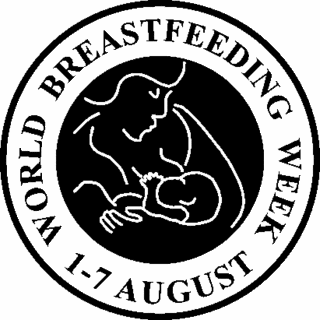
August 1-7 is World Breastfeeding Week.
We hear a lot about the benefits of breastfeeding a newborn but rarely do we hear about the benefits of “extended” breastfeeding (which is really only “extended” because of the American norm of weaning by one-year of age). The World Health Organization recommends nursing until at least two-years of age. Rather than looking at social norms they’re focusing on the health benefits of the child.
I’ve listened to different breastfeeding moms talking about “extended” nursing. Some of the popular arguments I’ve heard is that it’s selfish of the mom to breastfeed past a year or that a child should not be nursing when they can ask for it or lift up the mom’s shirt. I really believe those thoughts just come from our culture. Look at the stats – by 18 months old less than 5% of American children are still breastfed.
I love breastfeeding but I don’t condemn those who use formula or who don’t nurse past a year. It is a very personal decision. That being said, anyone who knows me knows that when something interests me I love to do research on the subject. I also know a lot of women who nurse past a year. So, since we already hear so much about nursing an infant I thought I’d share some of the (what I find to be) interesting facts & benefits of nursing a toddler. I truly thinks it’s fascinating what God created our bodies to do!
• Human milk expressed by mothers who have been lactating for >1 year has significantly increased fat and energy contents, compared with milk expressed by women who have been lactating for shorter periods. During prolonged lactation, the fat energy contribution of breast milk to the infant diet might be significant."
-- Mandel 2005
• In the second year (12-23 months), 448 mL of breastmilk provides:
o 29% of energy requirements
o 43% of protein requirements
o 36% of calcium requirements
o 75% of vitamin A requirements
o 76% of folate requirements
o 94% of vitamin B12 requirements
o 60% of vitamin C requirements
-- Dewey 2001
• Nursing toddlers between the ages of 16 and 30 months have been found to have fewer illnesses and illnesses of shorter duration than their non-nursing peers (Gulick 1986).
• "Antibodies are abundant in human milk throughout lactation" (Nutrition During Lactation 1991; p. 134). In fact, some of the immune factors in breastmilk increase in concentration during the second year and also during the weaning process. (Goldman 1983, Goldman & Goldblum 1983, Institute of Medicine 1991).
• Per the World Health Organization, "a modest increase in breastfeeding rates could prevent up to 10% of all deaths of children under five: Breastfeeding plays an essential and sometimes underestimated role in the treatment and prevention of childhood illness."
• Scientific research by Katherine A. Dettwyler, PhD shows that 2.5 to 7.0 years of nursing is what our children have been designed to expect (Dettwyler 1995).

No comments :
Post a Comment